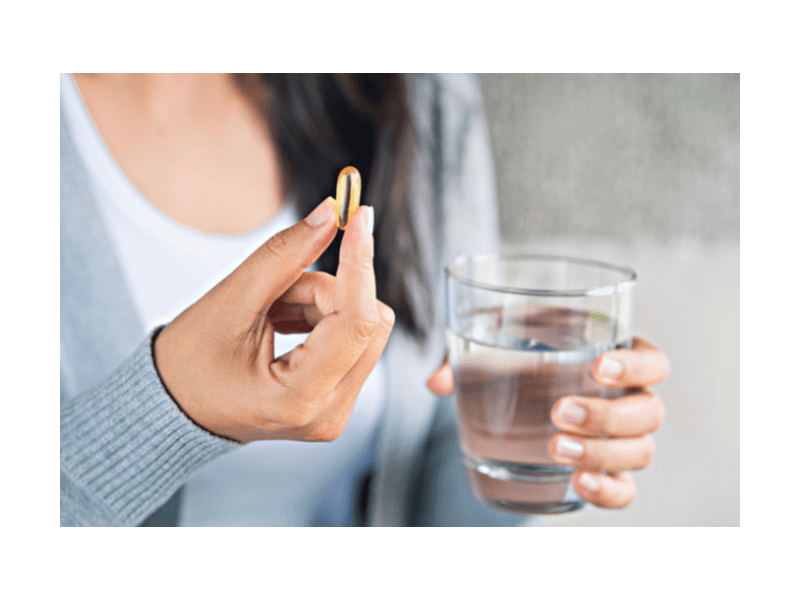Supplements for ulcerative colitis – what should I take?
If you have ulcerative colitis you may well have been recommended to take supplements to prevent nutritional deficiency. This is a common risk for those with IBD where inflammation impacts the body’s ability to absorb nutrients from food.
But which supplements should you take? And what are the benefits?
Here we share the best vitamins and supplements for ulcerative colitis and how they can help reach symptom remission faster.
What is ulcerative colitis?
Ulcerative colitis (UC) is a long-term form of Inflammatory bowel disease (IBD) that causes inflammation to the colon or large intestines. This results in small ulcers which cause bleeding along the lining of the colon.
While the exact cause of UC is unknown, it’s usually the result of an immune system dysfunction. Normally the immune system defends the body against infection. But for those with ulcerative colitis, their immune system mistakenly attacks healthy tissue, food and good bacteria that lines the colon, resulting in inflammation and sores.
The main symptoms are bloody diarrhea, stomach pain and frequently going to the toilet. But there are also many other signs including fatigue, weight loss, lack of appetite, and dehydration.
While there isn’t a cure for ulcerative colitis, making changes to your diet with the help of an expert licensed dietitian that’s specialized in IBD can reduce symptoms and help to reduce inflammation.
How can supplements and vitamins help?
Many practitioners recommend vitamins and supplements for ulcerative colitis to help the body get the nutrition that it needs. Those with UC often don’t eat enough food through a loss of appetite or simply in trying to avoid a flare-up of symptoms. This increases the risk of malnourishment and stops your body from getting the calories, vitamins, and minerals it needs to heal.
Some prescribed medicines for ulcerative colitis can also have an effect on how the body absorbs minerals including calcium, vitamin D, zinc and B vitamins.
What are the best supplements for ulcerative colitis?
The best nutrients come from eating a well-balanced diet, as recommended by a licensed dietitian. However, taking vitamins and supplements are a simple way for those with ulcerative colitis to get the vitamins and minerals they need when diet alone isn’t enough.
Below are the most commonly recommended supplements for those with ulcerative colitis:
Vitamin D
Vitamin D plays an important part in how your immune system works to protect your body against infection. It also keeps bones, teeth, and muscles strong.
Vitamin D is naturally created in the body through the skin’s reaction to sunlight – not such a problem in summer, however, during the winter months, even the healthiest individuals are prone to a vitamin D deficiency.
In addition, those with darker skin tone and living in colder areas are more at risk to be low in vitamin D.
Those with a chronic inflammatory disease like IBD are also more at risk for low levels of vitamin D since it plays a key regulatory role in inflammation (1,2,3).
One study found that 30% of IBD patients had low vitamin D levels, yet when given an appropriate replacement, they had much fewer symptoms.
Great sources of Vitamin D include:
- Oily fish such as salmon or tuna
- Mushrooms
- Vitamin D3 supplements
It’s important to note that if Vitamin D was low on your latest lab- food sources aren’t typically enough. You’ll need to work with your health care providers to get a specific dose that’s appropriate to treat your levels. Therefore taking Vitamin D supplements is a good alternative.
Calcium
Calcium is another vitamin that strengthens bones and teeth. It is specifically recommended for those with IBD as the natural levels of calcium are often impacted by medicines such as corticosteroids.
Foods that are rich in calcium that we commonly recommend:
- Sardines or salmon (with bones)
- Leafy greens such as spinach or kale
- Tofu
- Soy milk
- Tahini Paste
Calcium supplements are even more effective when taken with vitamin D.
Omega-3
Often found in fish oil, omega-3 fatty acids have many health benefits. However, the biggest advantage is its ability to reduce inflammation in the colon and decrease overall disease activity.
Natural sources of omega-3 include:
- Fatty fish such as salmon, sardines, and tuna
- Nuts and seeds (particularly flaxseed, chia, and walnuts)
- Plant-based oils such as flaxseed oil and soybean oil
Taking Omega-3 supplements can also help to support your joint health and reduce pain, a common symptom for those with ulcerative colitis.
In addition to toning down inflammatory pathways, some evidence has shown that omega 3’s results come from its antioxidant qualities at higher doses (5,6,7,8).
Folate
Folate is a B vitamin that helps the body to produce new cells as well as to process carbohydrates and fats. It’s also recommended to pregnant women to protect against birth defects and can even reduce the risk of colon cancer, of which those with UC have a higher risk.
Folate (the natural form of folic acid) is found in many foods including:
- Leafy green vegetables such as kale, cabbage, brussel sprouts, and spinach
- Beans
- Broccoli and asparagus
- Peas and kidney beans
- Avocado
Certain medications for ulcerative colitis can impact the body’s ability to absorb folate from foods, so taking a high quality and well absorbed multivitamin comes highly recommended.
It’s important to note, multivitamins can vary significantly in quality and in our ability to absorb the nutrient forms used in them.
We recommend multivitamins that contain nutrient forms that are well absorbed. We prefer multivitamins that use the active form 5-MTHF (5-methyltetrahydrofolate) rather than folic acid (10,11,9).
Iron
Iron is found in red blood cells and helps to carry oxygen through the body. Not having enough iron can cause you to become anemic, leading to fatigue and dizziness.
In more serious cases severe anemia can lead to arrhythmia, fast heart rate, and a weakened immune system. The digestive tract bleeding and inflammation caused by ulcerative colitis can result in an iron deficiency therefore supplements are often recommended.
We only recommend supplementing iron if you are low in iron or at risk of being low.
It’s important to check if you have enough iron through a blood test as too much iron can be toxic.
We suggest working with your healthcare team to get the correct dose since this can vary quite a bit. In some cases, supplementation may not be warranted and your health care provider might recommend other ways of handling anemia like iron infusions or transfusions in more severe cases.
Get help for ulcerative colitis with a specialized nutrition plan
Not sure which foods you should be eating? Fed up of having a restricted diet? Our professional dietitians can help you to create an individualized nutrition plan that reduces your symptoms and makes food more enjoyable.
We’ve helped hundreds of people just like you with ulcerative colitis. Join us on the road to recovery and apply for a custom nutrition plan today.
Resources
Vitamin D
- Ananthakrishnan, A. N., Khalili, H., Higuchi, L. M., Bao, Y., Korzenik, J. R., Giovannucci, E. L., Richter, J. M., Fuchs, C. S., & Chan, A. T. (2012). Higher Predicted Vitamin D Status Is Associated With Reduced Risk of Crohn’s Disease. Gastroenterology, 142(3), 482–489. https://doi.org/10.1053/j.gastro.2011.11.040
- Ardesia, M., Ferlazzo, G., & Fries, W. (2015). Vitamin D and Inflammatory Bowel Disease. BioMed Research International, 2015, e470805. https://doi.org/10.1155/2015/470805
- Castro, F. D. D., Magalhães, J., Carvalho, P. B., Moreira, M. J., Mota, P., & Cotter, J. (2015). LOWER LEVELS OF VITAMIN D CORRELATE WITH CLINICAL DISEASE ACTIVITY AND QUALITY OF LIFE IN INFLAMMATORY BOWEL DISEASE. Arquivos De Gastroenterologia, 52(4), 260–265. https://doi.org/10.1590/S0004-28032015000400003
- Nic Suibhne, T., Cox, G., Healy, M., O’Morain, C., & O’Sullivan, M. (2012). Vitamin D deficiency in Crohn’s disease: Prevalence, risk factors and supplement use in an outpatient setting. Journal of Crohn’s and Colitis, 6(2), 182–188. https://doi.org/10.1016/j.crohns.2011.08.002
Omega 3’s
- Aslan, A., & Triadafilopoulos, G. (1992). Fish oil fatty acid supplementation in active ulcerative colitis: A double-blind, placebo-controlled, crossover study. The American Journal of Gastroenterology, 87(4), 432–437.
- Barbosa, D. S., Cecchini, R., El Kadri, M. Z., Rodríguez, M. A. M., Burini, R. C., & Dichi, I. (2003). Decreased oxidative stress in patients with ulcerative colitis supplemented with fish oil omega-3 fatty acids. Nutrition (Burbank, Los Angeles County, Calif.), 19(10), 837–842. https://doi.org/10.1016/s0899-9007(03)00162-x
- Stenson, W. F., Cort, D., Rodgers, J., Burakoff, R., DeSchryver-Kecskemeti, K., Gramlich, T. L., & Beeken, W. (1992a). Dietary supplementation with fish oil in ulcerative colitis. Annals of Internal Medicine, 116(8), 609–614. https://doi.org/10.7326/0003-4819-116-8-609
- Stenson, W. F., Cort, D., Rodgers, J., Burakoff, R., DeSchryver-Kecskemeti, K., Gramlich, T. L., & Beeken, W. (1992b). Dietary supplementation with fish oil in ulcerative colitis. Annals of Internal Medicine, 116(8), 609–614. https://doi.org/10.7326/0003-4819-116-8-609
Folate
- Ebbing, M., Bønaa, K. H., Nygård, O., Arnesen, E., Ueland, P. M., Nordrehaug, J. E., Rasmussen, K., Njølstad, I., Refsum, H., Nilsen, D. W., Tverdal, A., Meyer, K., & Vollset, S. E. (2009). Cancer incidence and mortality after treatment with folic acid and vitamin B12. JAMA, 302(19), 2119–2126. https://doi.org/10.1001/jama.2009.1622
- Patanwala, I., King, M. J., Barrett, D. A., Rose, J., Jackson, R., Hudson, M., Philo, M., Dainty, J. R., Wright, A. J. A., Finglas, P. M., & Jones, D. E. (2014). Folic acid handling by the human gut: Implications for food fortification and supplementation. The American Journal of Clinical Nutrition, 100(2), 593–599. https://doi.org/10.3945/ajcn.113.080507
- Wright, A. J. A., Dainty, J. R., & Finglas, P. M. (2007). Folic acid metabolism in human subjects revisited: Potential implications for proposed mandatory folic acid fortification in the UK. The British Journal of Nutrition, 98(4), 667–675. https://doi.org/10.1017/S0007114507777140




I am in Los Angeles. Suggest medical doctors, integrative medicine. Thank you
a medical doctor for what specifically?
Hi my name is Kacie. I have had UC for about 10 years. Currently taking apriso. I am in search of just one multivitamin with most of what I need vitamin wise. Can anyone help me?
Hi Kacie, sorry I missed this!
https://gutlove.us/product/complete-activated-multi/